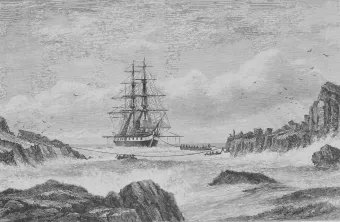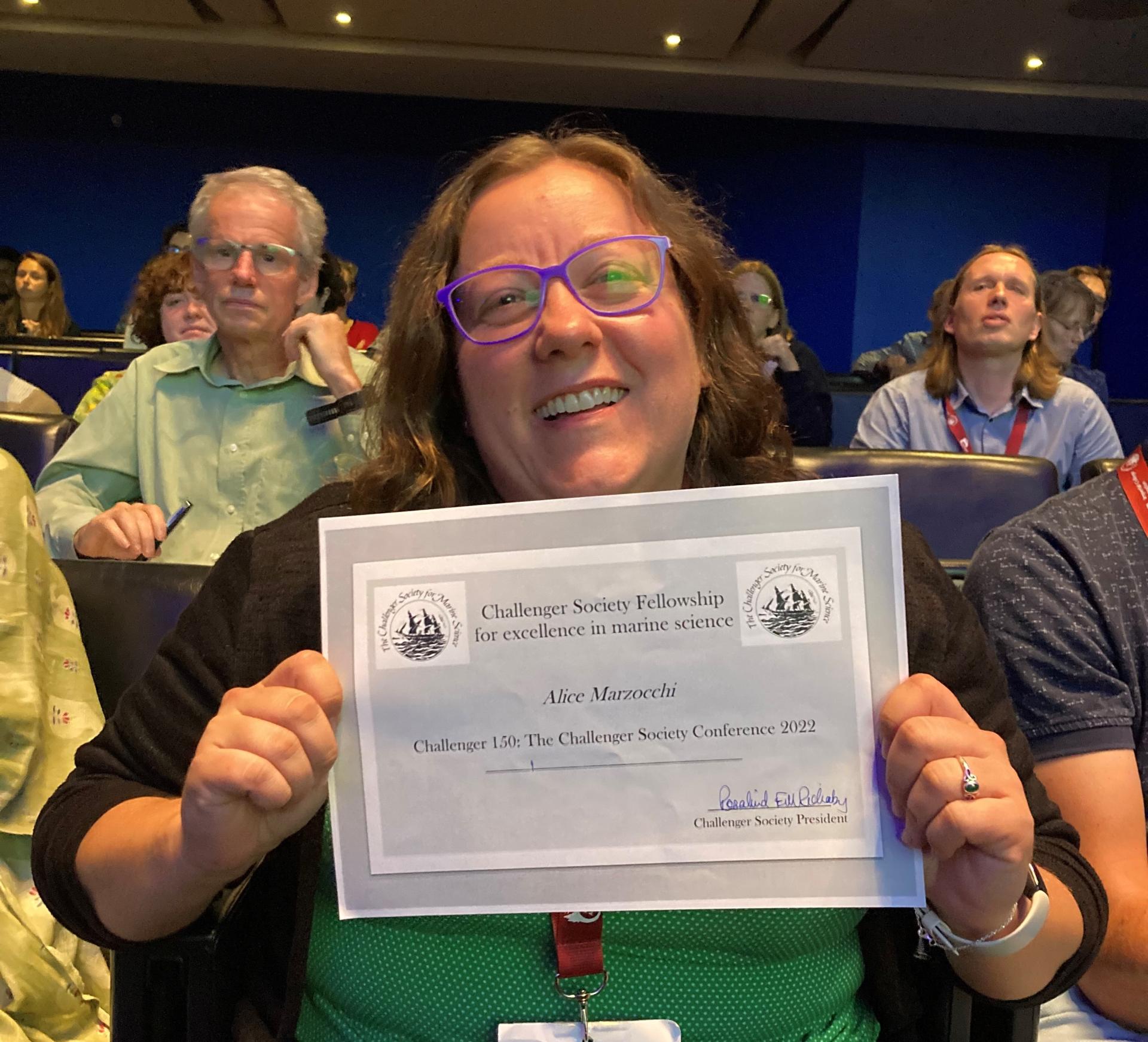
Over 70 representatives from the National Oceanography Centre (NOC) will discuss key ocean issues at Challenger Society Conference 2022, which marks the 150th anniversary of the Challenger expedition and celebrates the birth of international and interdisciplinary oceanography.
Professor Angela Hatton, Chief Scientist at the NOC will be a keynote speaker at the event, which is being held at the Royal Geographical Society and the Natural History Museum. The NOC’s sessions, presentations and poster sessions will focus on hot ocean topics, including net zero, digital ocean and ocean currents.

NOC scientist Dr Alice Marzocchi received an Early Career Challenger Society Fellowship for 2022 at the event, an award given to early career scientists to recognise and honour their achievement or promise in a branch of marine science. Alice’s research combines numerical models and observations to better understand past and present ocean and climate dynamics, and how these may change in the future, with a focus on high-latitude processes.
Alice was nominated for the award by the NOC’s Dr Joel Hirschi and Professor Simon Josey, and Alberto Naveira Garabato from the University of Southampton. Dr Joel Hirschi, Associate Head of Marine Systems Modelling said: “I was absolutely delighted when I heard that Alice Marzocchi had been awarded a Challenger Fellowship. This prestigious award recognises Alice’s talent for ground breaking science based and bold ideas in addition to her exemplary leadership skills in developing others. In short, Alice has the key attributes of a future leader in our field.”
The following sessions are led by NOC experts:
T6 – Towards a Net Zero Oceanographic Capability
Session Leads: Dr Ella Darlington, NOC, UK; Dr Kate Hendry, University of Bristol, UK; Professor Steve Fletcher, University of Plymouth, UK; Alvaro Lorenzo, NOC, UK
The UN Decade of Ocean Science for Sustainable Development presents the need for a Net Zero Oceanographic Capability (NZOC), which is further articulated by the G7 Future Seas and Oceans Initiative (FSOI) that commits nations to a review of requirements and improvements to meet this ambitious target.
A recent NZOC report, commissioned by the UKRI, has presented recommendations and possible pathways that the UK marine science community might take to contribute to, and potentially lead in areas of development to make such an ambition a reality.
T7 – Pushing the limits in autonomous oceanography in a net zero carbon world
Session Leads: Dr Filipa Carvalho, National Oceanography Centre, UK; Dr Marie Porter, Scottish Association for Marine Science, UK; Dr. J. Alexander Brearley, British Antarctic Survey, UK; Dr Giorgio Dall’Olmo, Plymouth Marine Laboratory, UK
As we work towards a net zero carbon world, how we collect our oceanographic data is also evolving. While this presents added challenges to continue existing time series, it also brings great opportunities. Autonomous platforms allow us to collect data in remote and challenging locations with little constraints.
They allow repeat transects, simultaneous measurements from neighbouring platforms, and long-term monitoring which results in a better understanding of the spatial and temporal scales of a given dynamic region.
With the ongoing push to develop new (and miniaturise existing) low-powered, yet high-resolution, sensors to fit these platforms, we can now measure concurrent variables across disciplines, allowing us to better understand the ecosystem as a whole. In this session we would like to discuss the use of different autonomous platforms to look at bio-physical and biogeochemical interactions. We are particularly interested in work involving new autonomous platforms or where platforms (and fitted sensors) have been pushed in terms of scientific applications, operating environment and/or platform capability.
T10 – Micro to macro: linking bottom-up and top-down approaches that investigate the function, resilience and conservation of Southern Ocean ecosystems
Session Leads: Dr Jennifer Freer, Dr Tracey Dornan, Dr Cecilia Liszka, Dr Anna Belcher, Dr Anne-Sophie Bonnet-Lebrun, British Antarctic Survey, UK, Dr Kathryn Cook, National Oceanography Centre, UK
Southern Ocean ecosystems are of global significance. Not only are they integral to our global food security and climate regulation, they contribute to some of the most uniquely diverse and productive ecosystems on Earth.
Understanding the interactions within Southern Ocean food webs, and the processes driving them, is vital for underpinning the sustainable management and conservation of these systems. This ecological knowledge goes further as it is essential for understanding an ecosystem’s role in influencing global ocean nutrient and carbon cycling – a role of increasing significance in the face of climate change.
This session aims to bring together insights from two major streams of ecological research in the region: those which study the pelagic environment and investigate bottom-up processes, and those which study marine predators and provide top-down perspectives on ecosystem processes.
Presentations in this session may fall within three themes:
- interactions between biogeochemical cycling, ecosystem processes, and productivity,
- impacts of environmental change on processes, species, or ecological interactions
- innovative methods or long-term syntheses that can inform Southern Ocean conservation and sustainable management.
Submissions from field, laboratory, or modelling studies are equally welcome. This session aims to be an open platform and we encourage early career researchers and underrepresented groups to present their work.
T24 – The Atlantic Meridional Overturning Circulation: Observations, Simulations and Equations
Session Leads: Neil Fraser, Sam Jones, SAMS; Alejandra Sanchez-Franks, NOC
The Atlantic Meridional Overturning Circulation (AMOC) is a dominant control on the climate of the Northern hemisphere. Transatlantic observing networks have provided transformative insights into AMOC strength and variability over the last two decades. However, fundamental questions remain over AMOC trends and variability over longer timescales, as well as the dynamical processes and geographical locations responsible for driving the AMOC.
This session will explore the use of observations, numerical models, proxy records, and theory to elucidate the role of the AMOC both in driving and responding to the changing climate.
NOC presentations
For full details, visit the conference website.
- Making the most of Data – Juan Ward, Engineering Manager, Ship Scientific Systems
- Digital twins and their potential role in Net Zero Oceanographic Capability (NZOC) – Dr Justin Buck, Senior Data Manager
- Demonstration of new in-situ biogeochemical sensors integrated in the Autosub Long Range (aka ‘Boaty McBoatface’) – Dr Matthew Patey, Analytical Scientist
- Estimates of the boundary currents and water masses associated with the AMOC from a continuous mooring array in the subpolar North Atlantic – Dr Alejandra Sanchez-Franks and Professor Penny Holliday
- Autonomous Lab-on-Chip Biogeochemical Sensors on the RAPID East Mooring Array – Dr Sara Fowell, Research Scientist
- Cessation of Labrador Sea Convection by Freshening through Submesoscale Flows – Dr Louis Clement, Research Scientist
- Enhanced northward ocean transport of anthropogenic carbon through recovery of overturning circulation may be affecting North Atlantic CO2 uptake efficiency – Dr Pete Brown, Observational Oceanographer
NOC poster sessions
- OceanGliders Oxygen SOP v1.0.0: A good example of open collaborative scientific work – Dr Patricia Lopez Garcia, Sensor Science Delivery Lead
- In situ analysis of pore water nitrate concentrations in estuarine sediments – Dr Allison Schaap, Associate Head, Ocean Technology & Engineering Group
- A combined Total Alkalinity-Dissolved Inorganic Carbon (TADIC) sensor for autonomous deep water oceanography – Euan Wilson, Researcher
- Cytochip: a portable system for rapid detection of Harmful Algal Blooms – Fabrizio Siracusa
- State of the Art Autonomous CO2 System Measurements Onboard Boaty McBoatface: Results from an 8-day Mission in the Celtic Sea – Emily Hammermeister
- Novel solution to the integration of sensors onto autonomous platforms – Jake Ludgate